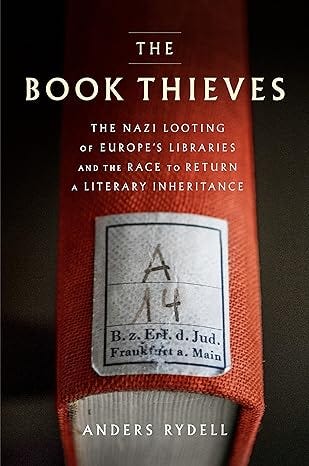Book Murder: Nazis in Poland and Latvia
New scholarship on Nazi Looting of Europe's Libraries
In the Book Thieves (2017) Anders Rydell relayed the untold story of Nazi book theft. When Nazi soldiers ransacked Europe’s libraries and bookshops, large and small, the books they stole were not burned. Instead, the Nazis began to compile a library of their own that they could use to wage an intellectual war on literature and history. In this secret war, the libraries of Jews, Communists, Liberal politicians, LGBT activists, Catholics, Freemasons, and many other opposition groups were appropriated for Nazi research and used as an intellectual weapon against their owners.1
Scholarship about books destroyed or looted during World War II continues. Here are some new studies.
Bibliomigration
Millions of Polish books were destroyed or stolen by Nazi Germany in Poland during World War II. Meanwhile, in August 1945, in the course of the relocation of the German-Polish border, millions of German books from private, church and public collections migrated to Poland - into a new national-cultural context. The term "the bibliomigratory" describes both the journey of these books in space and time and their changing semanticization within geographical, political, institutional, and linguistic spaces. For 75 years now, these books have been the subject of two completely different national narratives. They call for it to be understood as a common historical heritage and to be the starting point for research cooperation and intensified German-Polish cultural cooperation.2
The Book Murder: memories of librarians
The article, Book Murder, is dedicated to the history of the deliberate and systematic destruction of manuscripts, incunabula and old prints during the Warsaw Uprising and after its suppression. These are the last months of the German occupation of Warsaw, from 1 August 1944, the outbreak of the uprising, to the night of 16-17 January 1945, when the last German troops left the city. In view of the tremendous damage, this was called "book murder". The text is based mainly on the memories of librarians who witnessed the events themselves.3
Paths of Books of Latvian Jews
The aim of the research is to find out the influence of the Nazi regime on preservation of historical book collections, which were established in Jewish societies, schools, religious organizations and private houses in Latvia until the first Soviet occupation (1940/1941). At the beginning, libraries of Jewish associations and other institutions were expropriated by the Soviet power, which started the elimination of Jewish books and periodicals published in the independent Republic of Latvia. The massive destruction of Jewish literature collections was carried out by Nazi occupation authorities (1941-1944/45), proclaiming Jews and Judaism as their main “enemies”. However, digitized archives of Nazi organizations (mainly documents of the Reichsleiter Rosenberg Taskforce) shows that a small part of the Latvian Jewish book collections was preserved for research purposes and after the Second World War scattered in different countries. Analysis of archival documents will clarify the Nazi strategy for Latvian Jewish book collections. It will be determined which book values survived the war and what their further fate in the second half of the 1940s was.4
Anders Rydell, author of The Book Thieves: the Nazi Looting of Europe's Libraries, speech at the U.S. Library of Congress
Authors: Anders Rydell (Author), Henning Koch (Translator) The Book Thieves : The Nazi Looting of Europe’s Libraries and the Race to Return a Literary Inheritance. 2017. New York New York: Viking.
Jaccek Cord. (2024) “The destruction of libraries in the Polish capital during and after the suppression of the uprising (August 1944 to January 1945)” In: Books and their Ways pp.21-44 https://doi.org/10.30965/9783657791750_003
Dreimane, Jana. “The Paths of Books of Latvian Jews during World War II.” Knygotyra 71 (2018): 210–235.



